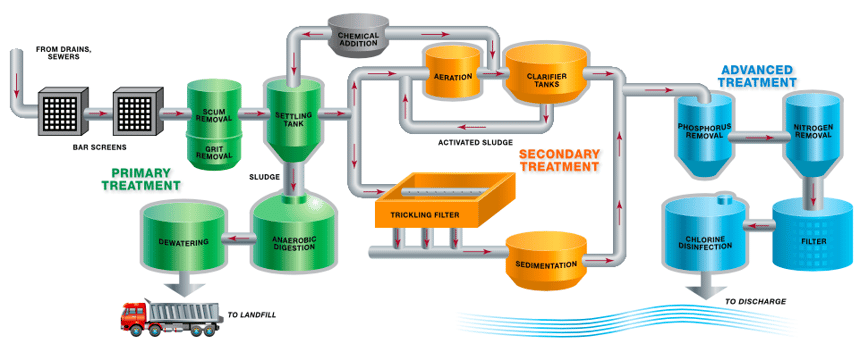This is Anthony Thompson, chief editor and the founder of this site, Tinyhousegarage. I'm a home architect. Basically, I've created this site to help people...Read more
The use of chlorine to disinfect wastewater has long been a standard practice in the water treatment industry. However, this method of disinfection has come under fire in recent years due to health concerns and environmental risks associated with it. As a result, many wastewater treatment plants are now seeking an alternative to chlorine.
In this article, we will talk about the different ways to disinfect wastewater without chlorine. We will discuss the advantages and disadvantages of each method, as well as the cost implications. In addition, we will explore how technological advances are allowing for more effective, environmentally friendly, and economical alternatives to chlorine for disinfecting wastewater. By the end, you will have a better understanding of the various methods for disinfecting wastewater without chlorine and how you can use them in your wastewater treatment plant.

Alternative to Chlorine for Disinfecting Wastewater
Chlorine is a well-known chemical used extensively to disinfect wastewater and potable water supplies. However, there are alternatives to chlorine that can be used in wastewater disinfection. This article will discuss the different options that can be used to disinfect wastewater instead of chlorine.
UV Radiation
Ultraviolet (UV) radiation is one of the most effective alternatives to chlorine for disinfecting wastewater. UV radiation works by destroying the nucleic acids in microorganisms, which inactivates them. This process is often referred to as “photolytic inactivation”. UV radiation is effective against a wide range of microorganisms, including bacteria, viruses, and protozoa. Additionally, UV radiation does not produce any byproducts, which makes it a very safe option for wastewater disinfection.
However, UV radiation requires specialized equipment and is not effective against certain types of microorganisms. Additionally, UV radiation is not effective if the wastewater contains particles that can block the UV radiation, such as sediment or oil. As such, it is usually used in combination with other disinfection methods.
Ozone Treatment
Ozone is another alternative to chlorine for disinfecting wastewater. Ozone works by reacting with the cell walls of microorganisms, which destroys their ability to reproduce. Ozone is very effective against a wide range of microorganisms, including bacteria, viruses, and protozoa. It is also very effective at breaking down organic matter, which can help reduce the amount of solids in the wastewater.
However, ozone is not effective if the wastewater contains particles that can block the ozone, such as sediment or oil. Additionally, ozone can react with certain chemicals in the wastewater to produce harmful byproducts, such as bromates and chlorates. As such, ozone is usually used in combination with other disinfection methods.
Chlorine Dioxide
Chlorine dioxide is another alternative to chlorine for disinfecting wastewater. Chlorine dioxide works by reacting with the cell walls of microorganisms, which causes them to become inactive. This process is known as “oxidative inactivation”. Chlorine dioxide is effective against a wide range of microorganisms, including bacteria, viruses, and protozoa. Additionally, chlorine dioxide does not produce any byproducts, which makes it a very safe option for wastewater disinfection.
However, chlorine dioxide is not effective if the wastewater contains particles that can block the chlorine dioxide, such as sediment or oil. Additionally, chlorine dioxide can react with certain chemicals in the wastewater to produce harmful byproducts, such as chloramides. As such, chlorine dioxide is usually used in combination with other disinfection methods.
Frequently Asked Questions about Alternative to Chlorine for Disinfecting Wastewater
Chlorine is a powerful disinfectant and widely used to treat wastewater, but it can have some drawbacks. Alternatives to using chlorine include ozone, ultraviolet light, and peracetic acid.
What are some alternatives to using chlorine to disinfect wastewater?
One of the most popular alternatives to using chlorine to disinfect wastewater is ozone. Ozone is a highly reactive gas that is produced by passing oxygen through an electric arc or ultraviolet light. It is a powerful oxidant and disinfectant and has a wide range of applications in wastewater treatment. Ozone is highly effective at killing bacteria, viruses, and other microorganisms, and it does not leave any toxic byproducts.
Another option for disinfecting wastewater is the use of ultraviolet (UV) light. UV light is a form of electromagnetic radiation that is produced when an electrical arc is passed through a glass tube filled with mercury vapor or argon gas. UV light is effective at killing microorganisms, but it can be costly and requires special equipment to operate safely.
Peracetic acid is another alternative to using chlorine to disinfect wastewater. Peracetic acid is a powerful oxidant and disinfectant that is produced by the reaction of acetic acid and hydrogen peroxide. It is an effective disinfectant for wastewater and does not leave any toxic residues.
What are the advantages of using alternatives to chlorine for disinfecting wastewater?
The main advantage of using alternatives to chlorine for disinfecting wastewater is that they do not leave any toxic byproducts. Ozone, UV light, and peracetic acid are all effective disinfectants, but they do not leave any toxic residues in the water. This means that the treated water is safe for use in drinking water, irrigation, and industrial processes.
Another advantage of using alternatives to chlorine is that they are more cost-effective. Ozone and UV light require specialized equipment to operate safely, but they are more cost-effective than using chlorine over the long-term. Peracetic acid is also relatively inexpensive and can be applied directly to wastewater.
What are the limitations of using alternatives to chlorine for disinfecting wastewater?
The main limitation of using alternatives to chlorine for disinfecting wastewater is that they may not be as effective as chlorine. Ozone, UV light, and peracetic acid are all effective disinfectants, but they may not be as effective as chlorine at killing certain types of microorganisms. Additionally, ozone and UV light require specialized equipment to operate safely, which can be costly.
Another limitation of using alternatives to chlorine is that they may be more difficult to remove from wastewater after treatment. Chlorine can be easily removed from wastewater with activated carbon or other types of filtration, but ozone, UV light, and peracetic acid may be more difficult to remove.
What safety precautions should be taken when using alternatives to chlorine for disinfecting wastewater?
When using ozone, UV light, and peracetic acid as alternatives to chlorine for disinfecting wastewater, it is important to follow safety protocols to ensure the safety of workers and the environment. Ozone and UV light require special equipment to operate safely, and peracetic acid should be handled with care as it is a powerful oxidant and disinfectant. Additionally, it is important to ensure that all wastewater is properly treated before it is discharged into the environment.
When using ozone, it is important to ensure that the ozone levels are kept within safe limits to prevent the formation of harmful ozone byproducts. With UV light, it is important to use protective equipment such as goggles and gloves and to limit the amount of time spent in direct contact with the UV light. With peracetic acid, it is important to wear protective equipment such as gloves and goggles and to avoid contact with the skin and eyes.
What other applications are there for using alternatives to chlorine for disinfecting wastewater?
Alternatives to using chlorine for disinfecting wastewater can also be used in other applications such as swimming pools and drinking water. Ozone is highly effective at killing bacteria and viruses and can be used in swimming pools to reduce the risk of contamination. UV light is also effective at killing microorganisms and can be used to disinfect drinking water. Peracetic acid can be used in a wide range of applications, including food processing and the treatment of industrial wastewater.

Wastewater Disinfection Treatment Alternatives
In conclusion, it is clear that chlorine is not the only option for disinfecting wastewater, and in fact, there are a variety of alternatives that can be used. Not only do these alternatives offer a greater degree of flexibility in terms of the types of wastewater that can be treated, but they are also less hazardous to the environment and human health, which is a key consideration for any wastewater treatment project. Furthermore, many of these alternatives are now becoming more widely available and increasingly affordable, making them viable options for those looking for an alternative to chlorine. With this in mind, it is evident that there are plenty of options available for those looking to disinfect wastewater without relying on chlorine.

This is Anthony Thompson, chief editor and the founder of this site, Tinyhousegarage. I'm a home architect. Basically, I've created this site to help people build tiny houses with a limited budget and land space or people who are homeless. As a home architect, I became very disheartened when I saw homeless people around me, which influenced me to create this site to help people build beautiful tiny houses.
More Posts
